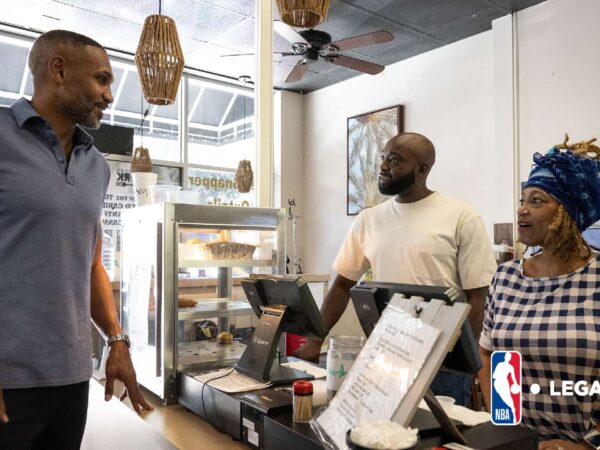CEO Luz Urrutia Testifies Before Congress
Luz Urrutia gave remarks to the House Committee on Financial Services on the importance of community-based lenders.

On February 16, 2022, Accion Opportunity Fund CEO Luz Urrutia testified before the House Committee on Financial Services. Luz discussed how community-based lenders are an essential resource for “underbanked” communities—especially during the COVID pandemic.
As a Community Development Financial Institution and the nation’s leading nonprofit lender, Accion Opportunity Fund is committed to connecting under-funded entrepreneurs to the capital and resources they need to thrive. Read on for Luz’s recommendations for increasing CDFIs’ lending capacity, encouraging sustainable public-private partnerships, driving financial inclusion through financial innovation, and advancing transparency and competition in the marketplace.
Read Luz’s remarks:
Good afternoon, Chairwoman Waters, Ranking Member McHenry, and Members of the Committee.
I am pleased to join you today to discuss the critical role of Community Development Financial Institutions (CDFIs) and Minority Development Institutions (MDIs) in providing essential financial products and services to underbanked communities.
My name is Luz Urrutia, and I am the CEO of Accion Opportunity Fund—a leading CDFI providing capital, networks, and coaching to under-resourced and underbanked entrepreneurs. Prior to joining Accion Opportunity Fund, I spent almost 20 years at Wachovia, led expansion efforts for companies like Oportun and Dollar Financial Group, and founded El Banco de Nuestra Comunidad—a Georgia-based community bank for the underbanked Hispanic population. I have served as an expert in small business and consumer finance on several government-appointed boards and commissions, including the Consumer Advisory Council of the Federal Reserve Bank and the Consumer Financial Protection Bureau (CFPB) Consumer Advisory Board. My entire career has been focused on financial services, with the bulk of my experience devoted to serving unbanked and underbanked populations across all parts of society.
Accion Opportunity Fund
Small businesses uplift communities and anchor local economies, while creating opportunities for themselves, their families, their employees, and our neighborhoods. Yet underserved entrepreneurs—primarily people of color, women, and immigrants—struggle to secure capital and resources. For over 25 years, Accion Opportunity Fund has deployed over $1 billion in small business loans and New Market Tax Credit (NMTC) investments to underbanked entrepreneurs and low-income communities across the country. Over 80% of our borrowers identify as people of color with nearly one in three identifying as female. Sixty-three percent are of low-to-moderate income. In the last year alone, we supplied $124 million in small business loans to nearly 3,000 entrepreneurs across the country.
In combination with our lending and community development efforts, Accion Opportunity Fund provides free technical assistance and educational resources to all small business owners, including those that are not Accion Opportunity Fund borrowers. In 2021, we had nearly 1 million visitors to our 24/7 online Business Resource Library and provided close to 5,000 small business owners with direct programming.
Are you looking for funding for your business? Explore our Small Business Loan opportunities.
Transforming federal dollars into impact
As the nation engaged in the public health battle against COVID, the pandemic dealt heavy blows to Main Streets across the country. In the best-case scenario, businesses could pivot their business models to adapt to the ever-changing environment. In the worst-case scenario—and the unfortunate reality for many—businesses were forced to lay off employees and shutter doors permanently. At the height of the pandemic, Yelp reported 163,000 business closures with about 60% of businesses never re-opening.[1]
To face these unprecedented challenges, unprecedented resources were required. Accion Opportunity Fund is grateful for the federal government’s support to small businesses in the form of Paycheck Protection Program (PPP) loans and supplemental funding for CDFIs and MDIs. For our part, Accion Opportunity Fund provided nearly $34.5 million in PPP loans to 2,100 diverse small business owners. We actively sought to serve the smallest of businesses at a time when the most prevalent PPP lenders prioritized existing banking relationships and larger, more profitable businesses.[2]In fact, our average PPP loan size amounted to $16,400—less than a quarter of the national average of $67,650.[3] Furthermore, at a time when the rate of PPP lending to majority-White neighborhoods was higher than those for any majority Asian, Black, or Hispanic neighborhoods in most large metro areas, 58% of our PPP loans went to people of color and 42% to women.[4]
When the smallest businesses and those owned by women and entrepreneurs of color needed immediate capital relief and support the most, CDFIs and MDIs rose to the challenge. Across the board, Community Financial Institutions (CFIs), including CDFIs and MDIs, made more than $34 billion in PPP loans—more than double the $15 billion reserved originally for CFIs to lend under the program. Better yet, 78% of loans made by CFIs were under $150,000.[5]
As part of the historic $12 billion in capital investments and grants authorized by Congress to support CDFIs and MDIs, $3 billion was set-aside for non-depository institutions like ours. In June 2021, Accion Opportunity Fund received $1.8 million in Rapid Response grant funding. Our organization utilized the award to test and expand our underwriting criteria to reach more small business owners than before. We were able to extend loans to start-up businesses with just three months of operation and to businesses with lower annual revenues. We also utilized the funding to lower pricing for qualified loan recipients—on average, our interest rates were brought down by 5%.
Combined, the $1.8 million in Rapid Response Program funding allowed us to issue up to 400 new $10,000 loans to small businesses that would have otherwise been declined due to projected higher risk and lower the price on an additional 250 loans at an average loan size of $24,000. Ultimately, we were able to leverage the $1.8 million to provide $10 million in loans to under-resourced entrepreneurs.
Combining federal aid with targeted, regional assistance
In the past two years, a number of funds were launched to support small businesses that did not receive sufficient federal funds—the New York Forward Loan Fund in June 2020, the California Rebuilding Fund (CARF) in November 2020, the Southern Opportunity and Resilience (SOAR) Fund in April 2021, and the Washington State Small Business Flex Fund in July 2021.
Together, these programs have raised more than $315 million in private capital to leverage public funds from participating states and, so far, have made $200 million in loans to more than 3,300 small businesses through a network of 25 participating CDFIs.
In addition to delivering federal funds through the Paycheck Protection Program (PPP), Accion Opportunity Fund led initiatives at the state level to offer more affordable capital to small business owners impacted by COVID. In our home state of California, we led the charge to create the California Rebuilding Fund—a public-private partnership that matches small businesses located in economically-disadvantaged and historically-underbanked areas of the state with 14 CDFI lenders. Funding for the California Rebuilding Fund was aggregated from an innovative array of private, philanthropic, and public-sector sources, including the State Small Business Credit Initiative (SSBCI). Businesses employing 50 or fewer full-time employees with gross revenues of less than $5 million are eligible to receive low interest rate loans up to $100,000 and free technical assistance/business support. Accion Opportunity Fund is the largest lender in the California Rebuilding Fund, having already provided $28.2 million to 527 small business owners negatively impacted by COVID.
Outside of our home state, we are also one of a dozen CDFIs taking part in the Southern Opportunity and Resilience (SOAR) Fund—a regional loan fund spanning 15 southern states. Small business owners in states like Texas, Georgia, Tennessee, and North Carolina who have suffered financially from the pandemic can apply for low interest loans of up to $100,000 and receive free business support. Like the California Rebuilding Fund, the SOAR Fund received capital infusions from philanthropic and corporate partners like the David and Lucile Packard Foundation, JP Morgan Chase, and Microsoft.
Without public-private partnerships like the SOAR Fund, small business owners, like Ethea in Houston, would not have been able to find opportunities to expand during the chaos of the pandemic. After being laid off, Ethea started her own business so that she could never be put into a place of unemployment again. She began sourcing and selling Ghanaian waist beads—strands of beautiful glass beads meant to be draped around one’s waist—as a means of connecting other Black women to their African diaspora roots. During the pandemic, she opened a second business, Wrapped and Waisted, and channeled her SOAR funding into inventory, rent, and payroll for the new location.
To date, the CDFIs in the four funds have made nearly $200 million in loans at an average loan size of approximately $59,000, and we have seen exciting results in reaching chronically underbanked businesses, including:
- 90% of loans having been made to businesses with 10 or fewer employees and less than $1 million in annual revenue (i.e., Very Small Businesses under SSBCI definitions)
- 65% of loans having gone to businesses owned by women and/or Black, Hispanic, Asian, or Native entrepreneurs
- 80% of loans having gone to businesses that would qualify as owned by Socially and Economically Disadvantaged Individuals (SEDI) under SSBCI guidance
- Overall, 98.4% of the businesses funded meet the definition of either a SEDI business or a Very Small Business.
Bridging gaps with private partnerships
Beyond channeling government funds into the hands of entrepreneurs, Accion Opportunity Fund sought new philanthropic and corporate partnerships to provide supplementalsupport to entrepreneurs. When small business owners shut down amid stay-at-home orders and struggled to cover existing debt obligations, we were able to provide over $10 million in debt payment relief to more than 5,000 small businesses through deferrals and forgiveness enabled by generous institutional and individual donors.
In addition to raising grant funds from institutional partners, we also established partnerships with corporations to raise loan capital and investment to under-resourced entrepreneurs. In April 2021, Accion Opportunity Fund entered into a partnership with American Express where they committed $40 million in patient, lower cost capital that we will leverage to provide $125 million in affordable loans to small Black-owned businesses, with the hopes of helping to support a more equitable financial system.
Latrice, an entrepreneur, Navy veteran, wife, and mother, benefited from this American Express partnership. She opened her Austin-based technical support business in February 2020. In need of a full-time operations manager, however, Latrice came to Accion Opportunity Fund after having worked with other lenders that did not offer the flexibility or terms that made financial sense for her business. Her Accion Opportunity Fund loan—her first-ever business loan—not only helped her hire an operations manager, but scale her company.
Corporate partnerships were not only essential to funding. We also launched partnerships to scale our education and network resources to reach more small business owners than ever before—at a critical time when existing business owners were looking for ways to transition their business models and never-before entrepreneurs were motivated to start their own ventures out of a mixture of opportunity and necessity.[6]
The pandemic disproportionately affected women, devastating female-dominated industries and leading the U.S. into its first “shecession,” with job losses affecting women more than men.[7]As a result, women turned to entrepreneurship, spurring a wave of first-time business ventures. Research from Gusto and the National Association of Women Business Owners (NAWBO) reports that 49% of businesses launched in 2020 were founded by women.[8]
Our educational programming took aim at both supporting existing firms and uplifting burgeoning businesses—particularly those owned and operated by women and entrepreneurs of color. In 2021, our 24/7 online Business Resource Library attracted over a million visitors, and our direct programming reached nearly 5,000 entrepreneurs, with more than 65% of participants identifying as women, and roughly 75% identifying as people of color.
This includes our one-on-one coaching program that provided personalized business coaching to over 750 entrepreneurs in the last year, collaborating with non-profit and corporate partners like TrustPlus, Samuel Adams, and FedEx to address the individual needs of each business owner. Our business advisors had front row seats to witness and support small business owners and budding entrepreneurs during the pandemic. Among the entrepreneurs we supported through this program, a majority reported being women and entrepreneurs of color. We also hosted 30 webinars in the same year on relevant topics, such as how to access government COVID assistance and manage cash on-hand during emergencies. These webinars attracted more than 4,600 views from 49 states—again, with most attendees identifying as women or entrepreneurs of color. Many of our courses and webinars are done in Spanish to support Spanish speaking and Limited English Proficiency customers.
CDFIs, with our expertise and decades of community lending, were able to supply the hardest-hit communities with the financial means and educational support needed to weather the pandemic. We were able to do this with the unprecedented federal aid supplied to us in response to COVID and the additional government, philanthropic, and corporate partnerships we sourced.
The future of CDFIs
As we transition to life beyond the pandemic and the necessary crisis-level response from the government, CDFIs will benefit from bipartisan policies that use the vast resources of the federal government to attract private investment and capital. I believe that everyone on this committee wants to see a level playing field for entrepreneurs that have talent, determination and grit to build and scale a business, but may be held back by historic inequities and lacking the resources they need. To continue delivering affordable capital to the smallest businesses and work our way toward a more equitable financial system, we offer the following recommendations:
-
Increase CDFI lending capacity
CDFIs have proven their ability to deliver on capital promises and affect real change in the communities they serve for over 40 years. In order to continue and significantly expand this work, increasing the lending capacity of CDFIs would be critical to sustain our progress.
We believe that many provisions discussed in today’s hearing would be beneficial in expanding CDFI resources and reach.[9] We find the provision requiring 40% of all CDFI Fund appropriations to be reserved for minority lending institutions (MLIs)—depository and non-depository—would be a welcome boost to CDFIs that consistently serve underrepresented populations.
We ask that this be paired with an increase in annual appropriations to the CDFI Fund; the CDFI Fund should be robustly funded at $1 billion annually given the historic work and impact of CDFIs. In doing so, CDFIs of all sizes would benefit from expanded lending and technical assistance support. We also ask that CDFI Fund financial awards be allocated more proportionally according to organization size and lending activity. For example, CDFIs with drastically different portfolio sizes have been awarded the same amount of CDFI Financial Assistance (FA) and Technical Assistance awards. It would be prudent and more impactful to allow for more funding to the organizations that wish to scale their lending and/or technical assistance and can prove portfolio and customer growth.
Organizations with the capacity to lend across state lines should be given the opportunity of adopting a national charter. Because lending caps and regulations vary drastically from one state to another, offering financial products across state lines requires a tremendous amount of legal complexity and cost that many CDFIs—despite ample lending capability—cannot shoulder. In markets where CDFI presence is minimal, this limitation restricts the amount of capital flowing to under-resourced entrepreneurs.
Instituting a national charter would allow for CDFIs, proven lenders with responsible track records, to compete more fairly in a marketplace that already tilts in favor of less transparent lenders. In doing so, a national charter would allow CDFIs to reduce their costs of operation, create partnerships between larger CDFIs and smaller ones, and ultimately provide small business owners with more freedom and choice when navigating financing options.
Regarding other provisions we support: the small-dollar loan program will allow CDFIs to provide low-cost loans to people that are denied by banks (and give them safe alternatives to debt-trap products); the establishment of the Supporting Young Entrepreneurs Program as a unique public-private partnership will cultivate start-ups by underserved entrepreneurs; and, while we are not a depository institution, the idea of impact banks and the mentor-protege program will help MDIs.
Furthermore, we support the proposed technology grants that would increase CDFI capacity to invest in operational support, including operations, technology, systems, and talent and fuel their on- and off-balance sheet growth. In addition, we recommend that marketing for customer acquisition be specifically covered under the grants as this is one of the major challenges CDFIs experience to scale. Finally, support for CDFIs, particularly the smallest ones, to help apply for this funding will be critical as well.
-
Encourage sustainable public-private partnerships
Public-private partnerships, enabled by the Treasury Department’s State Small Business Credit Initiative (SSBCI) program, should be made a permanent fixture of government policy. SSBCI was created through the Small Business Jobs Act of 2010 following the Great Recession and enabled states with the flexibility to deploy a limited menu of high impact credit enhancement programs—capital access programs, guarantees, collateral support programs, loan participations, and venture funds. It is a proven mechanism and a highly efficient way to use government funds to spur private capital into entering small business credit markets that are traditionally deemed too risky to enter. For every $1 provided by the federal government, the initiative required that at least $10 in capital be leveraged from the private sector.
Accion Opportunity Fund was the most prolific user of the original SSBCI Capital Access Program across the nation, accounting for over 4,700 transactions with an average loan size of $12,000. We were pleased to see that SSBCI was renewed in response to the pandemic and are looking forward to leveraging the funds and programs to drive more capital into the hands of under-resourced small business owners.
SSBCI enabled the launch of the California Rebuilding Fund which helped to attract bank and corporate lenders with capital to support lending to small businesses impacted by COVID.
-
Financial inclusion through financial innovation
We firmly believe that financial innovation can lead to greater financial inclusion. Accion Opportunity Fund has partnered with financial technology companies, or FinTechs, to provide capital to entrepreneurs that would otherwise be denied for financing. Working in conjunction with firms like Lending Club and FundingCircle, we have fostered an ecosystem that allows for a smart exchange of ideas and practices, ultimately providing small business owners with greater ease in application experience and more affordable capital for their businesses.[10]
Paired with the technology grants mentioned earlier, encouraging innovative partnerships between the non-profit and for-profit sectors would help bring mission-oriented CDFIs and MDIs to the forefront of the marketplace and foster greater financial inclusivity. We encourage Members of the Committee to focus on this area of importance as we look towards the future.
-
Transparency and competition in the marketplace
Accion Opportunity Fund is committed to financial innovation and smart regulations that help American entrepreneurs secure the best financing options for their businesses. Transparency in small business lending is critical to ensuring that the businesses powering the nation’s economy can make free and fair decisions about how to fund their growth. Too often, underserved entrepreneurs are denied access to capital and, in desperation, turn to bad actors that trap them into cycles of debt, with some entrepreneurs misled into paying annual percentage rates (APRs) as high as 350%.[11]
As a founding member of the Responsible Business Lending Coalition (RBLC)—a bipartisan consortium of non-profit and private lenders, advocates, and investors—Accion Opportunity Fund supports legislative and regulatory efforts that require all small business lenders to disclose the full terms of their lending products, including APR, so that small businesses have the necessary information they need to make apples-to-apples comparisons.
From truth in lending legislation to the implementation of Section 1071 of the Dodd-Frank Act, we believe these initiatives can encourage the development of more inclusive and higher-quality small business financing offerings simply by creating transparency into how the market is working today. Regulation that creates transparency to help the market improve its own behavior is a market-based, pro-competition alternative to imposing strict rules or costly subsidies.
Closing
I will conclude by sharing our gratitude for the many ideas we have seen from this Committee—including the series of provisions discussed in today’s hearing to provide greater support for CDFIs and MDIs. The pandemic crucified small businesses across the country in a manner that fully unearthed our nation’s racial wealth gap, and while CDFIs and MDIs were able to help provide for small businesses during this time, it is critical that the progress and momentum generated in the last two years continue onward. From maximizing the potential of the federal government’s investment, to leveraging these funds to attract corporate and private capital and building public-private partnerships, our organizations have moved full force in providing capital and support for under-resourced entrepreneurs.
Much more needs to be done in the form of increasing CDFI and MDI lending capacity, encouraging novel partnerships and technology, and clearing the way for full transparency in the marketplace. I believe the Members of this Committee will invest in the support and resources to get this done.
Thank you.
[1] Yelp, Local Economic Impact Report, September 2020. https://www.yelpeconomicaverage.com/business-closures-update-sep-2020
[2] New York Times, ”Minority Entrepreneurs Struggled to Get Small-Business Relief Loans,” April 2021. https://www.nytimes.com/2021/04/04/business/ppp-loans-minority-businesses.html
[3] Small Business Administration (SBA), “Paycheck Protection Program (PPP) Report,” May 2021. https://www.sba.gov/sites/default/files/2021-06/PPP_Report_Public_210531-508.pdf
[4] Los Angeles Times, “Businesses in majority-white communities received PPP loans at higher rates, analysis shows,” May 2021. https://www.latimes.com/california/story/2021-05-01/ppp-loans-coronavirus-pandemic-businesses-trump
[5] Opportunity Finance Network (OFN), “PPP Winds Down with CDFIs as Top Lenders,” June 2021. https://ofn.org/articles/ppp-winds-down-cdfis-top-lenders
[6] New York Times, “Surge in start-ups is a surprise in the pandemic economy,” February 2021. https://www.nytimes.com/2021/02/17/business/pandemic-entrepreneurs.html
[7] The Guardian, “The ‘shecession’: why economic crisis is affecting women more than men,” August 2020. https://www.theguardian.com/business/2020/aug/04/shecession-coronavirus-pandemic-economic-fallout-women
[8] Gusto, “Who Started Businesses During the Pandemic? A Survey of Women Starting Businesses During COVID,” March 2021. https://gusto.com/company-news/who-started-businesses-during-the-pandemic-a-survey-of-women-starting-businesses-during-covid
[9] Committee on Financial Services, “February 16, 2022, Full Committee Hearing entitled, “An Unprecedented Investment for Historic Results: How Federal Support for MDIs and CDFIs Have Launched a New Era for Disadvantaged Communities,” February 2022. https://financialservices.house.gov/uploadedfiles/hhrg-117-ba00-20220216-sd002.pdf
[10] LendingClub, “LendingClub Partners with Opportunity Fund and Funding Circle, Increasing Financial Inclusion and Small Businesses’ Access to Credit,” April 2019. https://www.prnewswire.com/news-releases/lendingclub-partners-with-opportunity-fund-and-funding-circle-increasing-financial-inclusion-and-small-businesses-access-to-credit-300835943.html
[11] Accion Opportunity Fund, “Unaffordable and Unsustainable: New Business Lending,” May 2016. https://aofund.org/news/unaffordable-and-unsustainable-new-business-lending/



